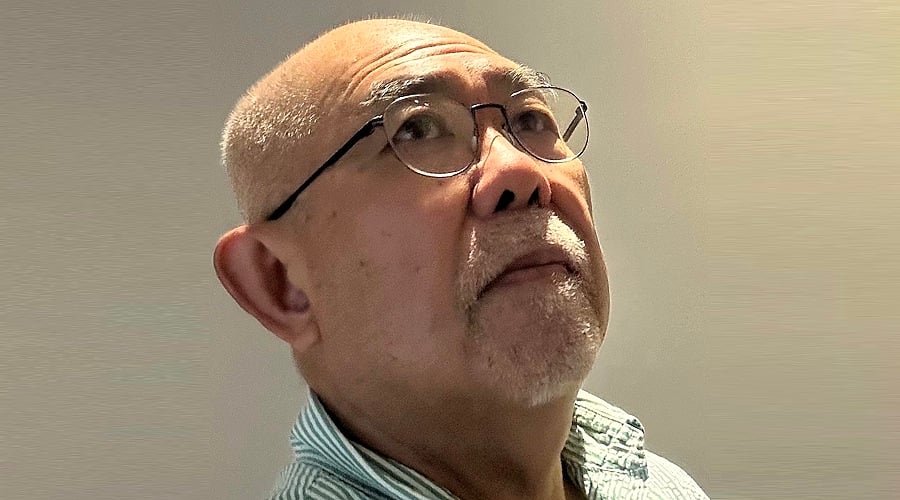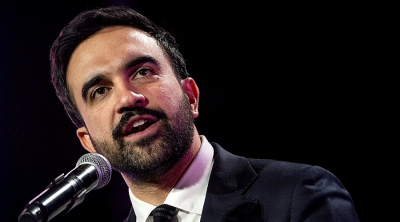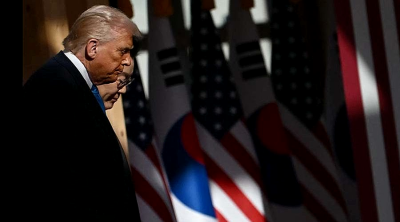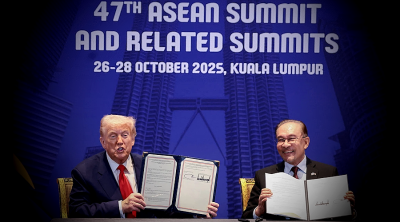
In his recent essay “Is Democracy Worth Saving?”, Malaysian social activist and former head of Bersih, Thomas Fann, argues that despite its flaws, democracy remains the best system to give citizens a voice and hold leaders accountable.
He draws from Malaysia’s struggle, where democratic backsliding is a lived reality.
His call to defend democracy is vital, yet incomplete without critical scrutiny of the United States.
With just 5 percent of the world’s population but outsized wealth and influence, America is on a perpetual military crusade with its Western allies, ostensibly to shape the world to its image.
However, when democracy is weaponized abroad, the chief beneficiary is the military-industrial complex.
Democracy also justifies trade wars. Ironically, the self-styled global champion of democracy, Donald Trump—elected with 54 percent of the popular vote—impressive by Western standards, has hollowed out democracy at home. Yet he continues to enjoy public support.
Any attempt to “save democracy” based on the Western template must therefore grapple with the American experience.
President Lincoln’s timeless words defined democracy as “government of the people, by the people, for the people.” Yet even in Lincoln’s era, this was an illusion: millions were enslaved and excluded from citizenship.
Only through abolition, Black enfranchisement, and women’s suffrage did the U.S. inch closer to its democratic promise.
But as old barriers fell, a new one rose: the steady capture of democracy by moneyed elites.
Fann emphasizes institutional guardrails against demagogues. But the U.S., with its many guardrails, has seen them collapse like jelly.
Trump’s rise illustrates a deeper problem: a media environment compromised by billionaire ownership.
The looming battle over TikTok, one of the most influential platforms in shaping political discourse, reveals how plutocrats treat information as an asset to control.
When media power is concentrated in the hands of the wealthy, democracy ceases to be “rule by the people.”
The paradox of American democracy is sharpened by inequality.
The U.S. contains vast wealth yet suffers widening disparity.
As hedge fund billionaire Ray Dalio observes, capitalism’s success breeds inequality that corrodes the social fabric. This is the missing piece in Fann’s account: democracy is undermined not only by demagogues but by an economic system that reproduces plutocracy.
Healthcare is the clearest case. The U.S. spends over 15 percent of its federal budget on healthcare—more than Europe or China—yet healthcare remains one of the most polarizing political issues.
Pharmaceutical giants and private medical conglomerates dictate prices, backed by multimillion-dollar lobbying.
Citizens pay the world’s highest drug costs while universal coverage is blocked.
The ballot box offers little remedy when both parties are captured by industry money.
Unless we imagine and build a post-capitalist framework that reconciles wealth with fairness, democracy will continue to fail—not only in America but across the world shaped by its shadow.
Foreign policy tells the same story. The military-industrial complex, which Eisenhower warned against in 1961, entrenches itself by funding hawkish think tanks and shaping global agendas.
Wars generate profits for contractors and sustain jobs in industrial heartlands. But they also displace millions, many of whom arrive on Western shores as refugees.
Instead of confronting this root cause, billionaire-owned media cast migrants as threats to jobs and social services.
Citizens, battered by inequality, are persuaded to direct anger at refugees rather than at plutocratic structures profiting from endless conflict.
The Fourth Estate—the media—is no longer the guardian of truth but the mouthpiece of ruling elites.
This global dimension is where Fann’s essay falls short.
The United States exports its democratic dysfunction: weaponizing rhetoric to justify interventions, fueling trade wars under the guise of national interest, and tying global stability to the profit motives of its defense industry.
Thus, democracy is not merely fragile in Malaysia or elsewhere—it is distorted by the gravitational pull of American plutocracy.
And so the circle closes. Democracy in theory depends on citizens making rational choices based on facts. In practice, voters are fed fear, bigotry, and falsehoods by elites who profit from division.
The result is a system that reproduces plutocracy at home and exports its distortions abroad.
If democracy is to mean more than ritualized elections, whether in Malaysia or elsewhere, it must confront this paradox.
It cannot coexist with runaway inequality, monopolized healthcare, militarized foreign policy, and concentrated media power.
Restoring integrity requires systemic change: campaign finance reform, protections against media monopolization, universal healthcare, demilitarization, and economic models that prevent wealth from converting into unchecked political influence.
Lincoln’s vision was never fully realized because equitable distribution of wealth was excluded from America’s democratic design.
The test of democracy in the 21st century is not just whether nations defend institutions but whether they confront the deeper structures of plutocracy.
Unless we imagine and build a post-capitalist framework that reconciles wealth with fairness, democracy will continue to fail—not only in America but across the world shaped by its shadow.
(TAN WAH PIOW is a lawyer and former Singapore student leader currently living in London.)
ADVERTISEMENT
ADVERTISEMENT








































